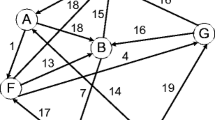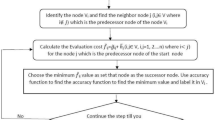Abstract
Plenty of problems are related to the calculation of edges and nodes in the realistic networks. It also influences the realization of shortest path problem (SPP) because of its essential fuzziness. This paper presents a fuzzy-based modified particle swarm optimization (fuzzy-based MPSO) algorithm for resolving the shortest path issue. The proposed work also evaluates the uncertainties of this shortest path problem through the utilization of offered algorithm. Actually, the normal PSO algorithm is altered and estimated to tackle the fuzzy-based SPP (FSPP) with uncertain edges. The performance of the planned algorithm will be improved; also the results are compared with the existing methodologies. The early convergence of the PSO technique can be alleviated and travelled via the dynamic operation of fuzzy method. And the proposed method is compared with other metaheuristic algorithms such as evolutionary random weight networks (GA-RWNs), grasshopper optimization algorithm with evolutionary population dynamics (GOA-EPD), levy weight grey wolf optimization (LGWO) and PSO in terms of cost and time consumption. The related results and discussion is performed in the working platform of MATLAB tool for the demonstration of the proposed work to manage the FSPP in indeterminate networks.










Similar content being viewed by others

References
Ahn CW, Ramakrishna RS (2002) A genetic algorithm for shortest path routing problem and the sizing of populations. IEEE Trans Evol Comput 6(6):566–579
Aini A, Salehipour A (2012) Speeding up the Floyd–Warshall algorithm for the cycled shortest path problem. Appl Math Lett 25(1):1–5
Aljarah I, Mafarja M, Heidari AA, Faris H, Zhang Y, Mirjalili S (2018) Asynchronous accelerating multi-leader salp chains for feature selection. Appl Soft Comput 71(1):964–979
Basrak Z (1987) Determination of the physical scattering matrix from a complete set of ambiguous solutions of the scattering problem by using the shortest-path method. Comput Phys Commun 46(1):179–186
Bhasin H, Gupta N (2018) Critical path problem for scheduling using genetic algorithm. In soft computing: theories and applications. Springer, Berlin, pp 15–24
Bökler F, Mutzel P (2017) Tree-deletion pruning in label-correcting algorithms for the multi-objective shortest path problem. In International workshop on algorithms and computation. Springer, pp 190–203
Bouts QW, Dwyer T, Dykes J, Speckmann B, Goodwin S, Riche NH, Carpendale S, Liebman A (2016) Visual encoding of dissimilarity data via topology-preserving map deformation. IEEE Trans Vis Comput Graph 22(9):2200–2213
Breugem T, Dollevoet T, Heuvel WVD (2017) Analysis of FPTASes for the multi-objective shortest path problem. Comput Oper Res 78:44–58
Chen J, Weiszer M, Locatelli G, Ravizza S, Atkin JA, Stewart P, Burke EK (2016) Toward a more realistic, cost-effective, and greener ground movement through active routing: a multiobjective shortest path approach. IEEE Trans Intell Transp Syst 17(12):3524–3540
Chuang TN, Kung JY (2005) The fuzzy shortest path length and the corresponding shortest path in a network. Comput Oper Res 32(6):1409–1428
Dey A, Pal A, Pal T (2016) Interval type 2 fuzzy set in fuzzy shortest path problem. Mathematics 4(4):62
Dib O, Manier MA, Caminada A (2015) A hybrid metaheuristic for routing in road networks. In: International conference on intelligent transportation systems, pp 765–770
Du J, Yu L, Li X (2016) Fuzzy multi-objective chance-constrained programming model for hazardous materials transportation. Int J Gen Syst 45(3):286–310
Faris H, Mafarja MM, Heidari AA, Aljarah I, Ala’M AZ, Mirjalili S, Fujita H (2018) An efficient binary salp swarm algorithm with crossover scheme for feature selection problems. Knowl Based Syst 154(1):43–67
Faris H, Ala’M AZ, Heidari AA, Aljarah I, Mafarja M, Hassonah MA, Fujita H (2019) An intelligent system for spam detection and identification of the most relevant features based on evolutionary random weight networks. Inf Fusion 48(1):67–83
Heidari AA, Delavar MR (2016) A modified genetic algorithm for finding fuzzy shortest paths in uncertain networks. Int Arch Photogramm Remote Sens Spat Inf Sci 41:1–5
Hougardy S (2010) The Floyd–Warshall algorithm on graphs with negative cycles. Inf Process Lett 110(8–9):279–281
Ioachim I, Gelinas S, Soumis F, Desrosiers J (1998) A dynamic programming algorithm for the shortest path problem with time windows and linear node costs. Networks 31(3):193–204
Klein CM (1991) Fuzzy shortest paths. Fuzzy Sets Syst 39(1):27–41
Korf RE (1987) Planning as search: a quantitative approach. Artif Intell 33(1):65–88
Lacomme P, Moukrim A, Quilliot A, Vinot M (2017) A new shortest path algorithm to solve the resource-constrained project scheduling problem with routing from a flow solution. Eng Appl Artif Intell 66:75–86
Lin KC, Chern MS (1993) The fuzzy shortest path problem and its most vital arcs. Fuzzy Sets Syst 58(3):343–353
Liu HX, Recker W, Chen A (2004) Uncovering the contribution of travel time reliability to dynamic route choice using real-time loop data. Transp Res Part A Policy Pract 38(6):435–453
Lou W, Liu W, Fang Y (2004) SPREAD: enhancing data confidentiality in mobile ad hoc networks. In: INFOCOM 2004. Twenty-third annual joint conference of the IEEE computer and communications societies, vol 4. IEEE, pp 2404–2413
Mafarja M, Aljarah I, Heidari AA, Faris H, Fournier-Viger P, Li X, Mirjalili S (2018a) Binary dragonfly optimization for feature selection using time-varying transfer functions. Knowl Based Syst 161(1):185–204
Mafarja M, Aljarah I, Heidari AA, Hammouri AI, Faris H, Ala’M AZ, Mirjalili S (2018b) Evolutionary population dynamics and grasshopper optimization approaches for feature selection problems. Knowl Based Syst 145(1):25–45
Megerian S, Koushanfar F, Potkonjak M, Srivastava MB (2005) Worst and best-case coverage in sensor networks. IEEE Trans Mob Comput 4(1):84–92
Mohemmed AW, Sahoo NC, Geok TK (2008) Solving shortest path problem using particle swarm optimization. Appl Soft Comput 8(4):1643–1653
Mohiuddin MA, Khan SA, Engelbrecht AP (2016) Fuzzy particle swarm optimization algorithms for the open shortest path first weight setting problem. Appl Intell 45(3):598–621
Osaba E, Del Ser J, Sadollah A, Bilbao MN, Camacho D (2018) A discrete water cycle algorithm for solving the symmetric and asymmetric traveling salesman problem. Appl Soft Comput 71(1):277–290
Qais MH, Hasanien HM, Alghuwainem S (2018) Augmented grey wolf optimizer for grid-connected PMSG-based wind energy conversion systems. Appl Soft Comput 69:504–515
Yang Y, Yan D, Zhao J (2017) Optimal path selection approach for fuzzy reliable shortest path problem. J Intell Fuzzy Syst 32(1):197–205
Zhang D, Chow CY, Liu A, Zhang X, Ding Q, Li Q (2017) Efficient evaluation of shortest travel-time path queries through spatial mashups. GeoInformatica 22(1):3–228
Author information
Authors and Affiliations
Corresponding author
Ethics declarations
Conflict of interest
Author declares that she has no conflict of interest.
Ethical approval
This article does not contain any studies with human participants or animals performed by the author.
Additional information
Communicated by V. Loia.
Publisher’s Note
Springer Nature remains neutral with regard to jurisdictional claims in published maps and institutional affiliations.
Rights and permissions
About this article
Cite this article
Dudeja, C. Fuzzy-based modified particle swarm optimization algorithm for shortest path problems. Soft Comput 23, 8321–8331 (2019). https://doi.org/10.1007/s00500-019-04112-1
Published:
Issue Date:
DOI: https://doi.org/10.1007/s00500-019-04112-1



